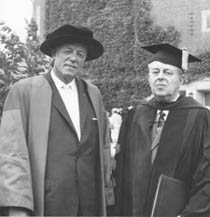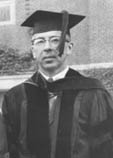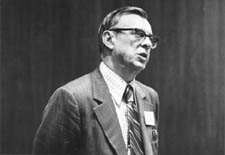1960
The first relationships with Herman C. Krannert begin to develop. Referred to Emanuel Weiler for advice regarding his Indianapolis-based firm, Inland Container Corp., Krannert approves a management development program for his executives, to be taught by Purdue faculty.
John Day becomes associate dean responsible for faculty affairs and Ronald Stucky becomes associate dean for external affairs and graduate student administration.
1961
The university awards its first doctoral degrees in economics. The first Bachelor of Science in Industrial Management degrees are awarded to 80 students. Approximately 95 percent of the BSIM class of 1961 are transfers from the Schools of Engineering. Patrick F. Gallagher is the first BSIM graduate to go directly into the master's program.
The Purdue Graduate School assigns to the School of Management the administrative responsibility for the interdisciplinary graduate program in industrial relations. It is renamed the Master of Science in Human Resource Management program in 1985.
There are 86 students enrolled in the MSIM program. The administration plans to keep Mondays free for students' job interviews and visits to prospective employers. One administrator notes that campus interviewers "are generally ineffective in seeking out special positions for men with experience," even though the MSIM class averages seven job offers per man. The average starting salary of positions accepted is $7,300. Types of positions accepted upon graduation include management consulting (accounting), marketing economic analysis, industrial relations, auditing, product development, and a variety of engineering-related positions. The majority of employment among MSIM graduates is engineering-related.
1962
 The Krannert Graduate School of Industrial Administration, Purdue's first named school, is established with a $2.73 million endowment from Herman C. and Ellnora Decker Krannert. The Krannerts provided additional funding for the construction of a new management building.
The Krannert Graduate School of Industrial Administration, Purdue's first named school, is established with a $2.73 million endowment from Herman C. and Ellnora Decker Krannert. The Krannerts provided additional funding for the construction of a new management building.
The Master of Science in Industrial Administration (MSIA) replaces the Master of Science in Industrial Management. There are 46 faculty members on the staff of the Krannert School.
Herman Krannert (right) received an honorary Doctor of Industrial Administration from President Hovde in 1962
1964
The school introduces a cooperative management education program that alternates semesters of class work on campus with semesters of paid employment at host firms.
1965
Classes move from Stanley Coulter Annex to the newly completed Krannert Building. George P. Baker, dean of the Harvard Business School, delivers the keynote address at dedication ceremonies attended by state and university dignitaries as well as by the school's benefactor, Herman Krannert
The Graduate Council approves plans of study for three men seeking a PhD in administrative sciences.
1966
Faculty and the Graduate Council approve the PhD in management science.
1967
The American Assembly of Collegiate Schools of Business (AACSB) votes unanimously to accredit and grant full membership to the Krannert School of Industrial Administration.
Ellen Day is the first woman to be enrolled as a full time student in the MSIA program. Computer science surpasses engineering as the most popular technical option in the BSIM program.
Krannert sponsors its first alumni management conference, attended by 100 graduates. The conference marks the 10th anniversary of the MSIA program. The results of a questionnaire show that the present salaries of MSIA alumni average more than $1,000 a month and that nearly six percent of them earn $20,000 to $30,000 a year. Professor Joseph C. Ullman is director of professional master's programs.
1968
 (Dean Emanuel Weiler)
(Dean Emanuel Weiler)
Emanuel Weiler decides to resign as dean, effective October 1, and return to teaching and writing. The MSIA program expands to three full section. Professor Donald C. King is named director for the master's program. Professor Robert W. Johnson receives the first Salgo-Noren Award for teaching excellence in the master's program.
The Business Opportunity Program (BOP) is established to give minority management students a head start on their freshman year at Purdue. This program is one of the first at a major U.S. business school aimed at attracting minority undergraduates to business careers and the first program of its kind at Purdue University. There are 11 students in the initial BOP summer session.
Jerry Rawls, a mechanical engineering graduate of Texas Tech University, earns an MSIA from the Krannert School.
1969
 (Dean John S. Day)
(Dean John S. Day)
John S. Day succeeds Emanuel Weiler as dean of the Krannert Graduate School of Management and Undergraduate School of Management. Weiler is named Herman C. Krannert Distinguished Professor of Management and Economics. Renee P. Manes becomes the associate dean.
Alumni organize the Krannert Alumni Foundation with Robert L Cattell, MSIA '68, serving as the first elected chairman of the foundation board.

